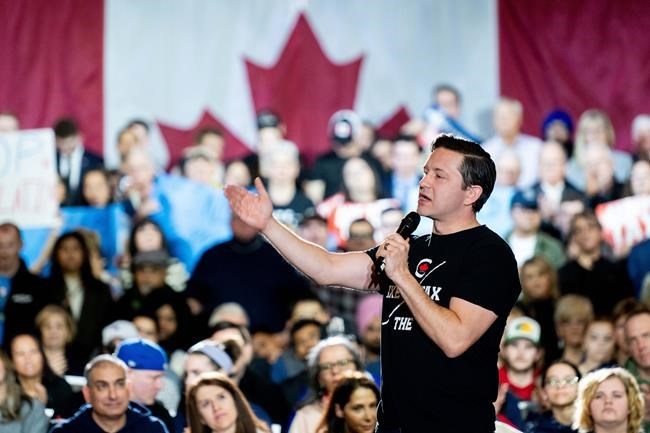OTTAWA — As the premier of Canada's largest province warned that Justin Trudeau's political future is tied to the fate of his consumer carbon price, the leader of the federal Conservatives urged the prime minister to convene an emergency meeting with his provincial and territorial counterparts.
Tuesday brought another day of attacks against the Liberals' carbon pricing policy, even as Trudeau sought to catch Canadians' attention by announcing billions in new spending for housing construction.
Ontario Premier Doug Ford minced no words in saying that the carbon price has to go — or Trudeau will.
And Conservative Leader Pierre Poilievre fired off his latest attack in a letter noting the $15-per-tonne increase to the consumer carbon price that kicked in on Monday.
The scheduled increase added about 3.3 cents more to the carbon price per litre of gasoline. A 50-litre tank will now see a carbon surcharge of $8.80, about $1.65 more than before.
The Opposition leader has spent the past month travelling across the country, including to Liberal- and NDP-held ridings in the Greater Toronto Area, Atlantic Canada and British Columbia, hosting "axe the tax" rallies.
Poilievre vows to scrap the policy if he becomes prime minister after the next election.
The federal Conservatives have long opposed charging the fuel levy to consumers, as well as small- and medium-sized businesses.
The party argues it amounts to a tax, and under Poilievre, conservative politicians have have ratcheted up their attacks in an attempt to connect carbon pricing to inflation and the pressures Canadians are feeling amid broader affordability woes.
Trudeau has pushed back against Poilievre's assertion the carbon price is adding to families' financial pain.
He says critics, including conservative premiers, are inflating the impact of the fuel levy. He also routinely points to the quarterly rebates families receive to help offset costs. The payments are most generous for low-income households.
In the lead-up to the April 1 increase, Trudeau dismissed calls from seven premiers to cancel it, including from the lone Liberal provincial premier, Newfoundland and Labrador's Andrew Furey.
All Atlantic premiers requested the pause, along with Saskatchewan, Alberta and Ontario, which staunchly oppose carbon pricing in general.
Ford told reporters Tuesday that while he has fought the policy for years, he believes there is no worse time for the levy to increase than during the current affordability crisis.
"Number 1 issue, bar none, is affordability ... affordable homes, affordable gas and affordable groceries," he added.
He also suggested Trudeau's political future is tied to the policy's future, telling reporters: "This carbon tax has to go or in a year-and-a-half, the prime minister's going."
The next federal vote can happen no later than October 2025.
"You must sit down with the premiers and listen to them," Poilievre wrote in a letter to Trudeau circulated on social media Tuesday afternoon.
"I am requesting that, within six weeks of receiving this letter, you convene an emergency meeting of Canada's 14 first ministers to discuss the carbon tax crisis," he said.
He added: "Included in these discussions should be your willingness to allow provinces to opt out of the federal carbon tax and pursue other responsible ideas for lowering emissions without taxes."
Furey had also requested that Trudeau convene an emergency meeting to discuss alternatives.
A spokesman for Trudeau said in a statement Tuesday that every province and territory worked with Ottawa to put carbon pricing in place in 2016.
He said along with the carbon price increase, rebates are also getting bigger.
"Meanwhile, Pierre Poilievre, who has yet to show any credible plan to tackle climate change, is lying about how the price on pollution impacts affordability, and wants to cancel the same Canada Carbon Rebate that puts more money back in the pockets of eight out of 10 Canadians."
The prime minister has said he's open to premiers pitching their own ideas, but any proposal must meet federal requirements when it comes to lower greenhouse-gas emissions.
Every jurisdiction must play its part, he said.
Trudeau underscored that point while in Dartmouth, N.S., on Tuesday for an unrelated housing announcement, just days after Nova Scotia Premier Tim Houston submitted a proposal to Trudeau called "Still Better Than a Carbon Tax Plan."
The document summarizes the steps Houston's government has taken to date to tackle climate change.
Speaking to reporters, Trudeau said he has not seen details of Houston's proposal. But he said the Nova Scotia government's earlier plans fell short of what Ottawa has required.
Manitoba NDP Premier Wab Kinew confirmed to reporters last week that he, too, was working on a proposal to request an exemption from the federal carbon price.
Trudeau said on Monday that the seven premiers complaining about the policy had yet to provide detailed plans on how else they would reduce greenhouse-gas emissions.
This report by The Canadian Press was first published April 2, 2024.
— With files from Mia Rabson in Ottawa and Keith Doucette in Halifax.
Stephanie Taylor, The Canadian Press



